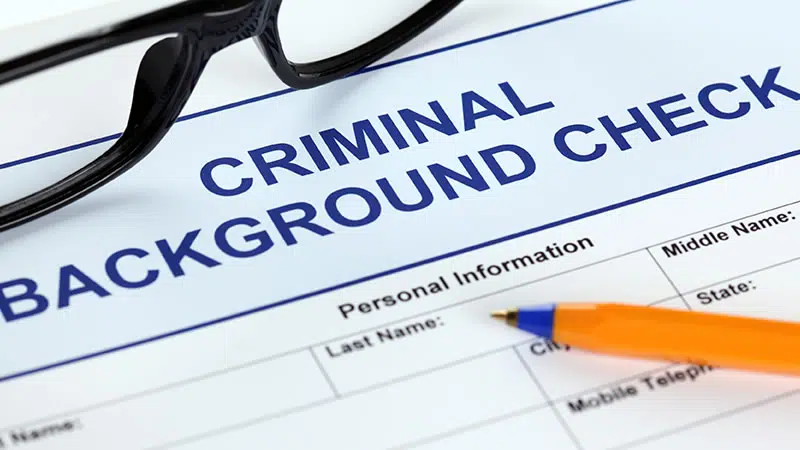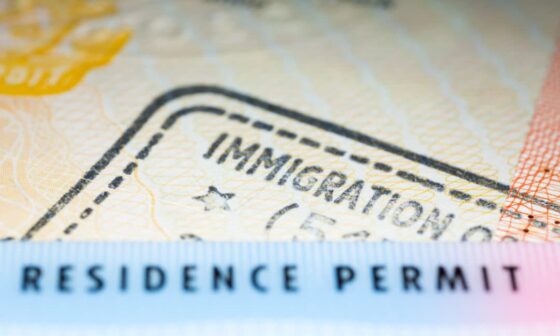During a recent conversation, a close friend expressed concern about an imminent immigration background check owing to a previously expunged incident. This prompted me to delve deeply into the subject to see how expunged records affect immigration procedures. Understanding this complex topic is critical for many Nigerians and others who travel internationally and apply for immigration.
What Is an Expunged Record?
Expunged records are criminal records that have been legally sealed or destroyed, rendering them inaccessible to the public. Many jurisdictions accept expunged records as if they never existed, providing a fresh start to people who have exhibited rehabilitation.

Why Do Immigration Background Checks Matter?
Immigration background checks are extensive procedures that guarantee that people entering a country do not constitute a security risk. These checks frequently include criminal background, job verification, and other pertinent information. Given the breadth of these checks, many people question if immigration officials can obtain expunged records.
Can Immigration See Expunged Records?
Yes, immigration authorities can see expunged records. In general, expunged records remain inaccessible to the public, including potential employers and private groups. Government agencies, especially immigration authorities, may have varying amounts of access, depending on the country and its regulations.
In the United States, for example, immigration authorities have greater access to criminal records, including expunged ones. This means that a record that has been sealed from public view can still be reviewed during the immigration procedure.
So, according to a National Association of Criminal Defence Lawyers research, law enforcement and immigration officials frequently have access to expunged records.
How Immigration Authorities Can See Expunged Records

Immigration officials can access expunged records through a variety of channels:
- Law Enforcement Databases: Expunged records may remain in national databases used by law enforcement organizations.
- Court Orders: If national security or other urgent reasons require it, immigration authorities can get court orders to unseal expunged records.
- International Agreements: Some nations have agreements allowing immigration offices to share criminal records, including expunged ones.
I recall a circumstance in which a colleague’s visa application was delayed because of a previous event that had been expunged. Although the record was sealed, immigration authorities wanted additional information. This experience emphasizes the necessity of understanding how expunged records affect immigration processes.
How to Pass Immigration Background Checks With Expunged Records

Full Disclosure
One of the most effective techniques is to be open about your past, even if the records have been expunged. Honesty can help avoid issues later in the process.
Example: A friend applied for a student visa and disclosed an expunged misdemeanor. Their application was successfully handled after they submitted paperwork and a letter of explanation.
Advertisements
Legal Assistance
Consulting with an immigration lawyer might provide useful information and suggestions. They can assist you in understanding your rights and present your case successfully.
Gather Supporting Documents
Collect any necessary documents, such as court orders for expungement and letters of recommendation, to support your application.
Use our Immigration Background Check Preparation Template to arrange your paperwork and speed up the procedure.
Template for Conducting Immigration Background Checks
By following this template, you can ensure you are well-prepared for your immigration background check, increasing your chances of a smooth and successful process.
Does Expunged Records Affect Visa Applications?
Yes, expunged records can have an impact on visa applications if immigration officials obtain them. Even if expunged records are no longer available to the public, government organizations may still have access to them. For example, in the United States, the U.S. Citizenship and Immigration Services (USCIS) and other immigration agencies have the authority to view these records during background investigations.
A Nigerian student applying for a US student visa had an expunged misdemeanor on his record. During the background check, USCIS discovered the expunged record, which prompted more scrutiny and delayed the visa acceptance process.
Advertisements
It’s critical to be prepared and supply all relevant information upfront. Failure to report an expunged record when questioned can be interpreted as deceptive, perhaps leading to visa denial.
According to the Migration Policy Institute, almost 15% of visa applications require additional administrative processing owing to background checks, which may include a review of expunged records.
What Should I Do If My Expunged Record Resurfaces During the Process?
Maintain your composure and produce any needed documentation. Here’s a step-by-step plan to manage the situation:
- Full Disclosure: If your expunged record is questioned, offer complete information regarding the incident and the expungement. Explain the facts and the actions you’ve taken to demonstrate recovery and responsibility.
- Documentation: Prepare all essential paperwork, including the court order for expungement, a copy of your criminal record indicating the expungement, and any letters of explanation or recommendation from credible sources.
- Consult Your Lawyer: An immigration lawyer can provide helpful advice. They can assist you in properly explaining your case and managing any legal complications.
A Nigerian professional asking for a work visa in Canada has an expunged record for a minor offense. When the record was highlighted throughout the process, his lawyer assisted in compiling a detailed file that included the expungement order as well as letters from his company and community leaders attesting to his reputation. This preemptive effort helped to reduce the impact on his application.
Do I Have to Disclose My Expunged Convictions on My Immigration Application?
Yes, you must reveal your expunged convictions in your immigration application. Although expungements might remove records from public view, they do not eliminate the legal requirement to divulge your whole criminal background when applying for immigration benefits. Immigration agencies, such as the United States Citizenship and Immigration Services (USCIS), require complete disclosure of all arrests, charges, and convictions, regardless of whether they have been expunged.
Failure to report an expunged conviction may be considered misrepresentation or fraud, with serious repercussions such as application refusal and future inadmissibility.
A minor drug offense on the record of a Nigerian green card application in the United States has been expunged. He chose not to reveal it, believing that no one would find out. During the background check, USCIS discovered the expunged record, resulting in the denial of his application for failing to disclose his complete criminal history.
Why Full Disclosure Is Important
- Transparency: Immigration officials admire honesty and openness. Disclosing your expunged offenses displays your commitment to be open.
- Legal Requirement: Full disclosure is legally required. Omitting any aspect of your criminal background may be interpreted as an attempt to mislead immigration authorities.
- Mitigating Factors: Providing a detailed explanation of the circumstances behind your expunged conviction, as well as evidence of rehabilitation, will help to mitigate the negative impact on your application.
Tip: If you’re not sure how to correctly declare your criminal background on your application, check with an immigration attorney. They can offer advice based on your individual scenario.
Do Criminal Convictions Affect My Immigration Status?
Yes, criminal convictions, particularly major or violent felonies, can have a considerable impact on your immigration status. The impact varies based on the nature of the crime, the jurisdiction, and the type of immigration benefit you seek.
Potential Consequences of Criminal Convictions
- Deportation: Certain criminal convictions can lead to an immigrant’s deportation. Common grounds for deportation include serious felonies, acts involving moral turpitude, and drug offenses.
- Inadmissibility: Certain convictions may render you inadmissible, preventing you from entering or re-entering the nation. This can have an impact on visa and green card applications, as well as other immigration benefits.
- Impact on Naturalization: Criminal convictions may impair your eligibility for naturalization. Naturalization requires good moral character, and certain criminal offenses may prohibit you from achieving this condition.
According to the United States Department of Homeland Security, approximately 44% of all removals in fiscal year 2019 were based on criminal charges.
Types of Crimes That Can Impact Immigration Status
- Aggravated Felonies: These are extremely serious felonies that can lead to severe immigration penalties, including expedited removal.
- Crimes Involving Moral Turpitude (CIMT): These offenses typically entail fraud, theft, or assault and can result in inadmissibility and deportation.
- Drug Offences: Convictions for banned substances, even minor ones, can result in deportation and inadmissibility.
If you have a criminal record, you should speak with an immigration attorney to determine how your convictions may affect your immigration status and plan a strategy to handle them.
What to Do If You Have a Criminal Record?
- Seek Legal Advice: Consult with an immigration attorney who specializes in criminal immigration issues. They can offer personalized guidance and guide you through the nuances of your situation.
- Collect documents: Gather all necessary documents, such as court records, proof of expungement, and any rehabilitation attempts or character references.
- Prepare to Explain: Be prepared to explain the circumstances surrounding your conviction, how you have changed since then, and why you pose no threat to the community.
A Nigerian candidate for Canadian permanent residency with a previous petty theft conviction collaborated with an immigration lawyer to create a complete application. This contained character references, evidence of community service, and documentation of the expungement, which resulted in a favorable resolution.
Understanding the impact of expunged and non-expunged criminal records on your immigration status will help you better prepare your application and prevent potential problems.
Are There Countries in Which Expunged Records Are Not Acceptable for Immigration?
Policies differ by country. Some nations have tight privacy regulations that prohibit immigration officials’ access to expunged records, but others have agreements that allow such information to be shared.
- United States: As previously stated, U.S. immigration authorities can examine expunged records. Applicants should be aware of this potential.
- United Kingdom: For certain visa applications, particularly those involving security clearances or sensitive employment, expunged records may be published.
- Canada: The Canadian immigration system may evaluate expunged records during the application process, especially if the expungement does not completely conceal the record from government agencies.
- Australia: In Australia, immigration authorities have access to expunged records in some cases, particularly if the offense is serious or related to the visa type.
- Schengen Area (Europe): For short-term visas, immigration authorities typically do not have access to expunged records. However, for extended stays or work permits, more thorough background checks may disclose expunged records.
Before applying for a visa, research the country’s specific immigration regulations. Consulting with an immigration lawyer who is knowledgeable about the regulations of that nation can help you understand the situation and plan accordingly.
A Nigerian entrepreneur looking to extend his firm into Germany spoke with a local immigration lawyer, who explained that while his expunged record was unlikely to harm his short-term business visa, it could be considered for long-term residency applications. This knowledge allowed him to better strategize his applications.
Read Also: Can Immigration Stop You at an Airport? A Guide for International Travelers
Understanding these nuances can help you negotiate the difficulties of immigration background checks and prepare to resolve any issues linked to expunged records.
Key Takeaways
- Depending on the country’s regulations, immigration officials may have access to expunged records.
- Honesty and full disclosure during the application process can avert issues.
- Consulting with an immigration lawyer offers useful guidance and support.
- Use an organized template to organize all required documents.
- Understanding the implications of expunged records will help you handle the immigration procedure more efficiently.
Conclusion
Understanding the subtleties of how expunged records influence immigration allows you to approach your path with confidence. While the question, “Can immigration see expunged records?” depends on various factors, being transparent and prepared is crucial. Ensure all your documents are in order, seek legal advice when needed, and stay informed about the specific requirements of the country you are applying to.
Have you or someone you know had difficulty with expunged records during immigration? How did you manage it? Please share your experiences and tips in the comments section below.
Related Articles
- Can Immigration Sponsorship Be Revoked? What Immigrants and Sponsors Need to Know
- Can Immigration Stop You at an Airport? A Guide for International Travelers
- Diversity Immigrant Visa: Top Secret Hacks to Get Approved Fast!
- Denied Entry at the Airport: Common Reasons and How to Avoid Them
- Looking to Japa? Here’s the Best Country for Nigerian Migrants
References
Advertisements






